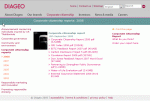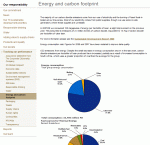 Alcohol – one of the most damaging drugs ever created by man. Excessive use leads to permanent brain damage and organ failure. Marriages, families and communities are continually torn apart by it.
Alcohol – one of the most damaging drugs ever created by man. Excessive use leads to permanent brain damage and organ failure. Marriages, families and communities are continually torn apart by it.
Last year, the Medical Research Council published a report in The Lancet which took into account not only the physical damage but also the social repercussions of drug misuse.
The report names alcohol as the fifth most damaging drug, behind heroin, cocaine, barbiturates and black market methadone.
Last month, Alcohol Concern released a report showing that nearly three quarters of UK men drink at least once a week, with up to a quarter indulging in binge drinking.
There are only two drinks companies in the FTSE100: SABMiller and Diageo. As manufacturers and suppliers of the most one of the most damaging substances known to man, their websites should be models of social responsibility. But will a review of their websites bear this out?
Diageo — The Corporate Citizen
Diageo splits its sustainability content into five sections which cover a broad gamut of corporate life: corporate governance; community and environment; reports; marketing and innovation.
Their focus is transparency. Seven policies and three codes are published under the governance section, with others made available in different sections as appropriate.
Similarly the report section contains not only the sustainability report and other associated information (such as GRI information), but also independent evaluations supplied by the likes of Business In The Community (BITC) and the Carbon Disclosure Project.
There is nothing unique about Diageo receiving these reports: anyone who participates in the schemes does. What is special is that the company has chosen to publish them alongside their own.
This upfront approach is refreshing. It shows a company which wants to engage with those visiting the website and invite them in for a closer look.
However PDF links are never the be-all of a sustainability website. Disappointingly, there’s no real HTML content to back these links up and give a broader view to the essential information inside the documents.
SABMiller — It’s Our Responsibility
SABMiller takes a different approach. There isn’t the same level of transparency in terms of governance or external evaluation. Instead there is a detailed, if slightly haphazard, account of many of their activities.
Much of this content stems from the company’s 10 Sustainable Development Priorities which, unsurprisingly, covers issues such as human rights, supply chains and transparency.
However, what is surprising is that SABMiller have chosen to publish their performance data relating to these priorities on their website in simple, easy to understand graphs.
The effect this has on a company’s sustainability presentation cannot be underestimated. It gives an immediate picture of performance over the long term without the need to pick up a weighty PDF tome.
For example, I now know that the company’s African operation use twice as much water as the North American one to produce the same amount of beer.
It’s a brave company which publishes such data in its shop window because a visitor could easily start to question the company’s sustainability effectiveness. However such uncertainty also leads to greater visitor engagement in order discover the answer.
In addition, it never does any harm to give analysts the figures they’re looking for up front. The figures may be good or bad, but the easier it is for analysts to find them, the more favourable the impression they’re likely to be left with.
Both together: Sustainable Citizenship
One thing both companies have a very firm hand on is the social and physical damage alcohol can cause. Each has launched its own site to inform and educate the public: TalkingAlcohol (SAB Miller) and DrinkIQ (Diageo).
The sites are well laid and do a good job in balancing the traditional “fun times” view of alcohol with the very real dangers of drinking.
In fact, I wish all sustainability issues were dealt with this well by the corporate world. Too often there is flannel and obfuscation around the harm a company’s products can do to an individual or community.
Many bleat “it’s not our products; it’s what people do with them”. This is very true, but in a world built upon product manufacturing and service provision we can no longer be close to the origin of what we consume.
In order for consumers to behave like grownups, companies need to stop treating them like children. In other words: provide the facts in a straightforward and honest manner and then leave consumers to make up their own mind.
Informative and engaging sites like these show how sustainability reporting should progress in the future. A sensible discussion on the effects and ingredients of a company’s products will allow people to fully appreciate how their choices effect sustainability.
It may not be deliberate and it may cover just one small aspect, but Diageo and SABMiller are now leading the way in sustainability reporting. The question is, how long it will take for others to follow their lead?
Lucy is Editor at Corporate Eye



